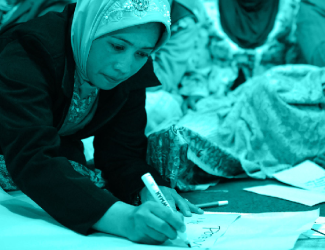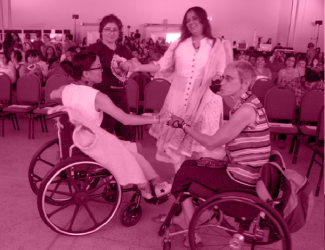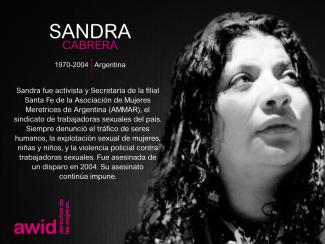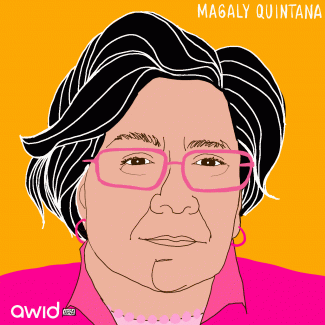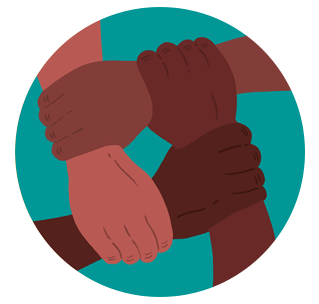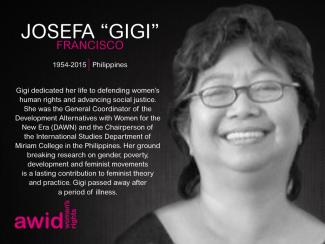-
Autonomia financiera, el Rompedor de Silencio
ORGANISATION DES FEMMES AFRICAINES DE LA DIASPORA (OFAD) ASSOCIATION LES PETITES MERES PRODADPHE ASSOCIATION AMBE KUNKO (AAK)
-
Contribución de las organizaciones feministas a la lucha contra el extremismo violento en Niger
Femmes Actions et Développement (FAD)
-
Autofinanciamiento: lxs mujeres a prueba de los telebancos
Rassemblement des Femmes pour le développement endogène et solidaire RAFDES
-
Alimentacion y soberanía alimentaria de lxs mujeres rurales
Association Song-taaba des Femmes Unies pour le Développement (ASFUD)
-
Líderes feministxs, comprometidxs en invertir la masculinidad positiva en la construcción de un nuevo orden social equilibrado en las localidades de la Región de Cavally, en la parte oeste de la Costa de Marfil: ¿Cómo provocar un cambio de mentalidad?
Une societe cooperative, la chefferie traditionnelle des localites, les autorites administratives et les autres associations feminines ONG Centre Solidarite "Investir dans les Filles et les Femmes
-
Co-creación de una metodología de madrinazgo
NEGES MAWON
-
Miles de oportunidades para salvar la tierra (MOST) apoyando la justicia climática para las comunidades locales e indígenas en la cuenca del Congo
Jeunesse Congolaise pour les Nations Unies (JCNU), Association Genre et Environnement pour le Développement (AGED)
-
Imaginar una política feminista queer asiática
ASEAN Feminist LBQ Womxn Network Sayoni
-
Apoyando la autogestión: doulas de aborto, acompañantes y redes radicales de apoyo
inroads
-
Feminismos en línea: cómo están recuperando la tecnología las mujeres
Feminism In India
-
Comité para la eliminación de la discriminación contra las trabajadoras sexuales
Asia Pacific Network of Sex Workers (APNSW), The International Women's Rights Action Watch Asia Pacific (IWRAW AP)
-
Liderazgo y organización feminista sostenible: experiencias personales y colectivas
HER Fund, Institute for Women's Empowerment (IWE) ,Kalyanamita, AAF
-
Realidades del Caribe: Radio Sauna Negra
WE-Change Jamaica
-
Cuidado a través de líneas telefónica de ayuda y experiencia de las mujeres
Generation Initiative for Women and Youth Network (GIWYN),Youth Network for Community and Sustainable Development (YNCSD), Community Health Rights Network (CORENET)
-
La sensualidad como resistencia: taller de movimiento corporal
UHAI EASHRI
-
Discoteca lésbica de estilo europeo oriental
Sapfo Collective
-
Instalación Utopía Feminista de FitcliqueAfrica, campamento de sanación del trauma y de autodefensa
FitcliqueAfrica (Fitclique256 Uganda Limited)
-
Hacer que las comunicaciones sean más queer para una internet abierta
Astraea Lesbian Foundation for Justice
-
¿Es capacitista la forma en que piensas sobre la salud sexual y reproductiva (SSR)? Buenas prácticas para programas e incidencia en SSR inclusivos de las personas con discapacidad.
Asia Pacific Network of Women with Disabilities and Allies
-
Decolonizar la comunicación no violenta
API Equality-LA, Sayoni, ASEAN Feminist LBQ Womxn Network
-
Enfoques centrados en el feminismo para llevar a juicio el acoso sexual en el mundo del trabajo
Women's Legal Centre
-
Mujeres en conflicto en Myanmar
Women's League of Burma, Rainfall
-
Espacios creativos caribeños, expresiones creativas y prácticas espirituales para la transformación comunitaria
CAISO: Sex and Gender Justice
-
POP-UPS: Poder justo: herramientas de poder popular para un futuro feminista
JASS/Just Associates
-
No anónimo: haciendo más queer las prácticas feministas de la diáspora negra africana acerca de la sobriedad
-
Brujería digital: pensamiento mágico para los futuros ciberfeministas
The Digital Witchcraft Institute
-
Construyendo manifiestos de mujeres: la agenda de las mujeres de base para el cambio en Asia-Pacífico
Asia Pacific Forum on Women Law and Development
-
Diseñando tus viajes astrales
EuroNPUD, narcofeminists as a loose group
-
Cuidado colectivo
RENFA Rede Nacional de Feministas Antiproibicionistas
-
Música de nuestros movimientos
Radical imagination
-
De desecho a carbón amigable con la ecología
KEMIT ECOLOGY SARL
-
El cuidado colectivo y la insurgencia de movimientos feministas antirracistas bajo contextos autoritarios y violentos
CFEMEA - Feminist Center of Studies and Advisory Services, CRIOLA - black women`s organization, Iniciativa Mesoamericana de Mujeres Defensoras
-
Quebrando el dominio de la religión patriarcal sobre la legislación de familia que afecta nuestras vidas #FreeOurFamilyLaws [liberen nuestras leyes de familia]
Musawah
-
Enfoque feminista para reclamar y controlar tierras dentro de inversiones
Badabon Sangho, APWLD
-
Paro mundial de mujeres: nuestra resistencia, nuestro futuro
Asia Pacific Forum on Women, Law & Development, ESCR-Net, Women's March Global
-
Hacia una «Madre Tierra» inclusiva
Disability Rights Fund, Open Society Foundation
-
De la inclusión a la infiltración: estrategias para construir movimientos feministas interseccionales
Mobility International USA (MIUSA)
-
Las historias ocultas de las mujeres con discapacidades invisibles: arte en acción
The Red Door, Merchants of Madness, Improving Mental Wellbeing through Art
-
Asociación entre lo público y lo privado y derechos humanos de las mujeres: aprendizajes a partir de estudios de casos en el sur global
Development Alternatives with Women for a New Era (DAWN)
-
El viaje interconectado: nuestros cuerpos, nuestra ciencia ficción
The Interconnected Journey Project, Laboratorio de Interconectividades
-
Recopilar y construir: una visión feminista alternativa para desafiar el orden económico mundial dominante
IWRAW Asia Pacific
-
La autopublicación como acto feminista
International Women* Space
-
Buenas prácticas de protección legal para minorías de género y sexuales en Pakistán y su interseccionalidad
Activists Alliance Foundation, Khawja Sirah Society, Wajood Society, Wasaib Sanwaro
-
Enfoques feministas para contrarrestar el tráfico
IWRAW Asia Pacific, Business & Human Rights Resource Center
-
Críticas al individualismo y a las políticas estatales: organización internacional contra la violencia dirigida
Masaha: Accessible Feminist Knowledge
-
Decolonizando la intimidad: cómo las identidades queer cuestionan las estructuras familiares heteronormativas
WOMANTRA
-
Yeki Hambe – Teatro de lxs trabajadorxs sexuales
Sex Worker Education and Advocacy Task Force
-
Creando la realidad feminista indígena: honrando lo sagrado femenino y construyendo nuevos caminos para las mujeres indígenas
Cultural Survival, International Funders in Indigenous Peoples
-
Los ojos en el antiprohibicionismo por parte de las mujeres brasileras
Mulheres Cannabicas, Tulipas do Cerrado
-
Comisión de la verdad feminista negra: abordando las injusticias para revolucionar el feminismo interseccional como nueva realidad
Black Women in Development
-
El cuidado comunitario es autocuidado: en los espacios seguros se cuentan historias verdaderas
Eurasian Harm Reduction Association, Metzineres, Urban Survivor’s Union, Salvage women and children from drug abuse
-
Ningún movimiento prohibido: conexiones a través del baile entre los derechos de las personas con discapacidad, los derechos de las personas trans y los derechos sexuales contra la violencia
National Forum of Women with Disabilities, Autonomy foundation, Nazyk kyz
-
El impacto de la captura corporativa de las realidades feministas: desarrollando herramientas para la acción
ESCR-Net | Economic, Social, Cultural Rights Network
-
Reimaginando el SIDA: construyendo una respuesta feminista al VIH
Frontline AIDS, Aidsfonds, IPPI (Indonesian Network of Women Living with HIV), UHAI-EASHRI (East African Sexual Health and Rights Initiative)
-
Promoviendo la justicia económica para materializar nuestra visión de un planeta feminista
International Network for Economic, Social and Cultural Rights, ESCR-Net
-
Café de lxs trabajadorxs sexuales
Hydra e.V.
-
Adoptando un enfoque ecofeminista para lidiar con el cambio climático y la seguridad alimentaria
Umphakatsi Peace Ecovillage, Human Rights Educational Centre
-
Conectando la base con lo internacional: la experiencia de una movilización creativa de lxs trabajadorxs sexuales en Europa
International Committee on the Rights of Sex Workers in Europe, STRASS - French Sex Worker Union, APROSEX, Red Edition
-
Experimentar con cómo puede ayudarnos la tecnología innovadora a sentirnos más segurxs cuando nos movemos en nuestras ciudades
Soul City Institute for Social Justice, Safetipin, Womanity Foundation
-
¿Son INfeministas las jerarquías dentro de las organizaciones?
Gay and Lesbian Coalition of Kenya National, Gay and Lesbian Human Rights Commission
-
Todas somos diferentes, pero tenemos valores compartidos
UNWUD (Ukrainian network of women who use drugs), JurFem Association, Women's Prospects
-
Un mundo sin clases
Bunge La Wamama Mashinani (Grassroots Women's Parliament)
-
Las mujeres empoderan a la comunidad
Institute for Women's Empowerment (IWE), Solidaritas Perempuan, ASEC Indonesia, Komunitas Swabina Pedesaan Salassae (KSPS)
-
Organización feminista: liderazgo transformador- trabajadoras en América Latina creando un movimiento sindical feminista y un mundo laboral feminista
Solidarity Center
-
Representar, portarse mal: feminismo de las personas con discapacidad decolonizando las narrativas de estigma a través del teatro participativo
Rising Flame, National Indigenous Disabled Women Association, Nepal, The Spectrum & Union of Abilities, The Red Door
-
Valorando y poniendo en el centro el descanso, el placer y el juego
ATHENA Network
-
El proyecto de juicio africano feminista
The Initiative for strategic Ligation in Africa (ISLA)
-
Voces desde las líneas del frente: apoyando el poder colectivo para poner fin al encarcelamiento de mujeres en el mundo
International Drug Policy Consortium, Equis Justicia para las Mujeres, National Council for Incarcerated and Formerly Incarcerated Women and Girls, Women and Harm Reduction International Network
-
Activismo queer joven: imaginando en una era de derechos humanos y desarrollo sostenible
African Queer Youth Initiative, Success Capital Organisation
-
Nuestras luchas, nuestras historias, nuestras fortalezas
Oriang Lumalaban, Pambansang Koalisyon ng Kababaihan sa Kanayunan
-
Rompiendo las barreras para la acción indígena colectiva sobre el clima en el Sudeste Asiático
Cuso International, Asia Indigenous Peoples' Pact
-
Amar a las mujeres positivas: yendo más allá del amor romántico hacia el amor comunitario profundo y la justicia social
Eurasian Women's Network on AIDS
-
Intersexualidad y feminismo
Intersex Russia
-
Entendiendo las experiencias y necesidades de salud reproductiva de las personas transgénero y de género diverso
Asia Pacific Transgender Network (APTN)
-
Porque ella cuida: conversaciones críticas sobre el activismo en VIH como trabajo de (des)cuidado
Because We Care Collaborative
-
El Manifiesto de los sistemas alimentarios del Mississippi
Center for Ideas, Equity & Transformative Change, National Council of Appropriate Technology - Gulf South, MS Food Justice Collaborative, Malcolm X Grassroots Movement
-
La experiencia de la copresidencia del movimiento de mujeres kurdo como ejemplo de logro feminista radical: ¡la copresidencia es nuestra línea PÚRPURA!
The Free Women’s Movement (TJA)
-
«Caminando sobre cáscaras de huevos»
Eldoret Women For Development (ELWOFOD), Mama Cash, Young women against Women Custodial Injustices Network
-
Libertad
-
La cárcel no es feminista: analizando el efecto y las alternativas a depender de la policía y el encarcelamiento
Migrant Sex Workers Project, Showing Up For Racial Justice
-
Bondo sin sangre: una forma feminista de reimaginar los ritos de pasaje de Sierra Leona
Purposeful
-
Tierra y territorios liberados: una conversación panafricana
Thousand Currents (USA), Abahlali baseMjondolo (South Africa), Nous Sommes la Solution (west Africa/regional), Movilización de Mujeres Negras por el Cuidado de la Vida y los Territorios Ancestrales (Colombia), and Articulation of Black Rural Quilombola Communities (Brazil)
-
Educación popular y organización para una economía feminista
Jamaica Household Workers Union (JHWU), United for a Fair Economy, Centro de Trabajadores Unidos en la Lucha (CTUL)
-
¿Así que quieres movilizar con una billetera vacía? Hagámoslo realidad
Breakthrough India
-
Compartir experiencias para establecer una red de defensoras de derechos humanos en África del este: la perspectiva ugandesa
Women Human Rights Defenders Network Uganda
-
Clínica tecnológica
Stichting Syrian Female Journalists Netowrk
-
Construyendo movimientos inclusivos: más allá de la inclusión simbólica
Rising Flame
-
Justicia y sanación para las sobrevivientes de la violencia de género: un debate interactivo sobre la justicia reparadora y la anatomía de una disculpa
One Future Collective
-
Acciones colectivas para poner fin a la transfobia con una perspectiva feminista
Asia Pacific Transgender Network, Iranti, Transgender Europe
-
Mujeres LBQ y asilo
Sehaq
-
Aborto y discapacidad: hacia un enfoque interseccional basado en los derechos humanos
Women Enabled International
-
Aprender cómo apoyar a las comunidades auto-organizadas de indocumentadxs, migrantes y trabajadorxs sexuales criminalizadxs
Buttrerfly (Asian and Migrant Sex Workers Support Network)
-
Autocuidado: una herramienta fundamental para sostener el activismo LGBTQI y feminista
United and Strong Inc., S.H.E Barbados, Lez Connect
-
Reclamando las VOCES-REALIDADES-PODER feministas jóvenes africanas para la justicia climática
Young Feminist organization Gasy Youth Up, Young African Feminist Dialogues
-
Mujeres en acción y solidaridad: representando nuestras realidades (Asia y África)
Women Performing the World (Asia/Africa)
-
Juntas en esto: fondos de mujeres y movimientos feministas creando juntos realidades feministas
Women Forum for Women in Nepal (WOFOWON)
-
Las no-ciudadanas: asuntos de la ciudadanía de las mujeres en el contexto de comunidades migrantes y vulnerables de Asia meridional
NEthing
-
Imaginando para una voz en las crisis migratoria y climática
Women's Refugee Commission, The Feminist Humanitarian Network, ActionAid
-
Juntas en esto: fondos de mujeres y movimientos feministas creando juntos realidades feministas
Mama Cash, Global Fund for Women, Urgent Action Fund - Africa
-
Creando magia con los movimientos feministas jóvenes: prácticas participativas que provocan alegría
Feminist organizing, FRIDA The Young Feminist Fund (Community), Teia
-
Derecho de protección de las mujeres en realidades difíciles: tres organizaciones de mujeres de comunidades marginales
NGO Asteria, Ermolaeva Irena and Bayazitova Renata. NGO Ganesha Musagalieva Tatiana. NGO Ravniy Ravnomu Kucheryavyh Tanya
-
Feminal – tradiciones contra el arte y la expresión
Bishkek Feminist Initiatives
-
Resistencia a través del conocimiento, el arte y el activismo: creación de una biblioteca feminista en Armenia
FemHouse, Armenia
-
Conquistando el sistema de la ONU con estrategias feministas (no necesitas ser abogada para divertirte)
Kazakhstan Feminist Initiative "Feminita", IWRAW Asia Pacific, ILGA World
-
Datos. Huh. ¿Para qué sirven? Datos feministas y organización para resultados feministas
International Women's Development Agency, Women's Rights Action Movement, Fiji Women's Rights Movement
-
La voz, el liderazgo y la influencia de las mujeres criminalizadas en leyes, políticas y prácticas de Kenia
Keeping Alive Societies Hope-KASH, Katindi Lawyers and Advocates, Vocal Kenya
-
De Colombia hacia el mundo, mujeres africanas como fuerza de cambio
Proceso de Comunidades Negras en Colombia -PCN, Solidarité Féminine por la Paix el le Develppment Integral -SOFEPADI,
-
Espacio afro-queer para escuchar y contar historias
AQ Studios, None on Record, AfroQueer Podcast
-
Una reivindicación de la identidad corporal
GBV Prevention Network : Coordinated by Raising Voices
-
Aprendamos de la Diversidad
Circulo de Mujeres con Discapacidad -CIMUDIS, Alianza Discapacidad por nuestros Derechos -ADIDE, Fundación Dominicana de Ciegos -FUDCI, Filial Puerto Rico de Mujeres con Discapacidad
-
Fútbol como herramienta Feminista
Fundación GOLEES (Género, Orgullo, Libertad y Empoderamiento de Ellas en la Sociedad)
-
Constelaciones migrantes
LasVanders
-
Diálogos ecofeministas para la defensa de los territorios.
CIEDUR (Centro Interdisciplinario de Estudios sobre el Desarrollo), Equit, Foro permanente de Manaos y Amazonia
-
El movimiento "La Frida Bikes"
La Frida Bike
-
Brujeria, chamanismo y otros conocimientos insurrectos contra el patriarcado
Colectiva Feminista MAPAS-Mujeres Andando Proceso por Autonomías Sororales
-
Experiencias, aprendizajes y desafíos para la gestión de la seguridad holística de organizaciones horizontales feministas y de la disidencia sexogenérica en tiempos de crisis social y política. La experiencia del levantamiento popular del 18-O en Chile
Fudación Comunidades en Interfaz
-
Alimento que todxs sabemos
Las Nietas de Nonó, Parceleras Afrocaribeñas por la Transformación barrial (PATBA)
-
Prácticas de resistencia ante el cambio climático de mujeres indígenas de Perú y Guatemala
Thousand Currents, Red de Mujeres Productoras de la Agricultura Familiar, Asociación de Mujeres Ixpiyakok (ADEMI, Ixpiyakok Women's Association)
-
Construyendo ciudades feministas
CISCSA, Articulacion Feminista Marcosur
-
Ponte en Mi Lugar
Alianza Discapacidad por nuestros Derechos - ADIDE, Circulo de Mujeres con Discapacidad -CIMUDIS
-
Limpiando el camino para la plenitud de vida de las mujeres, sanando traumas colectivos e históricos
Grupo de Mujeres Mayas Kaqla
-
Mujeres indígenas zapotecas desafiadas por la naturaleza.
-
Casas de Cuidado y Sanación para Defensoras De Derechos Humanos como parte el enfoque de la Protección Integral Feminista: Una Realidad Feminista
Iniciativa Mesoamericana De Defensoras de Derechos Humanos, Consorcio Oaxaca para el Diálogo Parlamentario y la Equidad A.C, Red Nacional De Defensoras De Derechos Humanos en Honduras, Coletivo Feminista de Autocuidado
-
Sanando tu voz de unicornix: Tejiendo tecnologías ancestrales y digitales para afilar la lengua
-
Trayectorias feministas para un protocolo de maternidad asistida en mujeres con discapacidad
Circulo emancipador de mujeres y niñas con discapacidad de Chile, CIMUNIDIS, WEI
-
Escuela para la niñez trans feminista
Fundación Selena
-
REDTRASEX: Experiencia De Organización Y Lucha Por Los Derechos De Las Mujeres Trabajadoras Sexuales De Latinoamerica y El Caribe
RedTraSex Red de mujeres trabajadoras sexuales LAC
-
Violencia de género en el mundo del trabajo sexual en México
Brigada Callejera de Apoyo a la Mujer, "Elisa Martínez", A.C., Red Mexicana de Organizaciones Contra la Criminalización del VIH. Red Mexicana de Trabajo Sexual
-
La migración nos obliga hacer camino al andar.
Asociación de Trabajadoras del Hogar a Domicilio y de Maquila. ATRAHDOM
-
Nuevas narrativas para mujeres negras: cuerpo, curación y placer.
-
Tejiendo memorias y redes - Feministas nehtas fortaleciendo los feminismos negros en América Latina y el Caribe (LAC)
Red de Mujeres Afrolatinoamericanas, Afrocaribeñas y de la Diáspora, Articulação de Organizações de Mulheres Negras Brasileiras (AMNB), Voces Caribeñas

